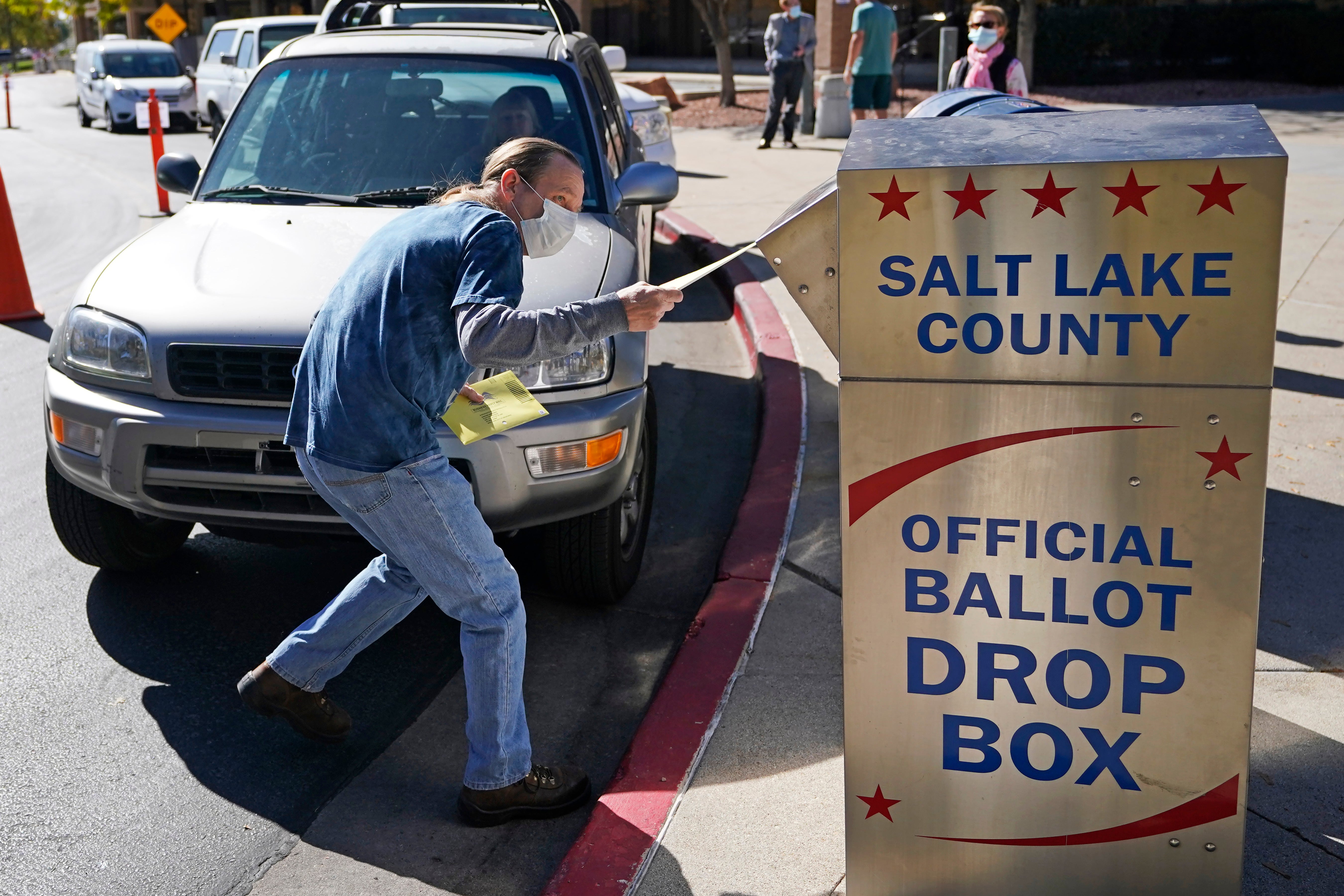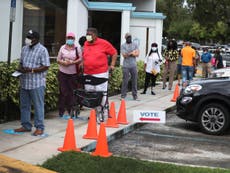Magic mushrooms, racism, and wolves: What else is on the ballot in America this year?
Almost $1 billion has been spent backing 120 different measures where voters will decide on policy

Your support helps us to tell the story
From reproductive rights to climate change to Big Tech, The Independent is on the ground when the story is developing. Whether it's investigating the financials of Elon Musk's pro-Trump PAC or producing our latest documentary, 'The A Word', which shines a light on the American women fighting for reproductive rights, we know how important it is to parse out the facts from the messaging.
At such a critical moment in US history, we need reporters on the ground. Your donation allows us to keep sending journalists to speak to both sides of the story.
The Independent is trusted by Americans across the entire political spectrum. And unlike many other quality news outlets, we choose not to lock Americans out of our reporting and analysis with paywalls. We believe quality journalism should be available to everyone, paid for by those who can afford it.
Your support makes all the difference.If you live in a place like California, every four years, your ballot arrives and it’s as long as a phonebook. This year, in addition to the presidential election, voters will have their say on 13 different statewide ballot propositions on issues ranging from the gig economy to kidney dialysis centres.
Across the country, according to Ballotpedia, which lists every initiative in every state, 32 states have 120 statewides measures on the ballot this year, as well as one measure each in Washington, DC and the US territories of Puerto Rico and the Virgin Islands. They touch numerous elements of American life, from elections, to voting, to taxes, to wolves, flags, and psychedelic mushrooms. Here’s a preview of what’s in store this year.
How do ballot initiatives work, and where do they come from?
Ballot initiatives take many forms — proposing new policy, amending state constitutions, approving previously passed laws — and go by many names (amendments, propositions, questions, measures), but they all have one thing in common: they allow citizens, rather than their representatives, to directly make and approve policy. Once an initiative passes the submission process, usually involving the collection of enough signatures, the power theoretically devolves to the people. (Though it is big money, all this grassroots democracy. Committees supporting and opposing these measures reported a total of $918.4 million in contributions and $646.6 million in expenditures so far, according to Ballotpedia, with California alone registering $547.5 million contributions.)
South Dakota was the first state to introduce initiatives, in 1898, and the tool caught on during the Progressive Era of the early 1900s, as reformers sought to give people more say in politics during a time of rapid urbanization, industrialization, and monopolization. Now, according to Claremont McKenna College’s Rose Institute of State and Local Government, California, Oregon, Washington, Colorado and Arizona “have emerged as the strongest initiative states.”
What’s on the ballot this year?
Gig workers, racism, and . . . wolves?
One of the most watched bellwether ballot measures is the country is California’s Prop 22. App-based service companies like Uber, Lyft, and Doordash are sponsoring the measure—the most expensive of the year, anywhere in the country—which would classify app-based drivers as independent contractors and not employees, entitling them to less benefits. It’s the first time the gig economy is on the ballot.
Ballot initiatives are also grappling with concerns about racism and the criminal justice system. Mississippi is considering Ballot Measure 3, which would replace its retired, Confederate-inspired flag, with a new one featuring a magnolia blossom.
Other states are considering racism too, both directly and indirectly, as Rhode Island ponders with Question 1 whether to strike “ Providence Plantations” from its official state name, and California’s Prop 25 weighs whether to uphold a 2019 bill eliminating cash bail, a system which disproportionately incarcerates people of color.
And then there’s Colorado’s Prop 114, a first of its kind measure to reintroduce gray wolves by 2023 to designated lands.
Drug reform
Initiatives have emerged as a key tool for legalization and decriminalization advocates, whose proposals are often more popular with voters than they are with legislators. A total of 14 states and territories have approved adult-use cannabis, and 33 have approved medical programs, according to the National Conference of State Legislatures. Most of those policies arrived by ballot. (Vermont was the first to do so through its legislature in 2018)
Arizona, Montana, New Jersey, and South Dakota will vote on legalizing recreational marijuana, and South Dakota and Mississippi will consider medical. South Dakota, ever the innovator, is the first state to decide on both forms in the same election.
Oregon’s Measure 109, meanwhile, would implement a legal program for people over 21 to take psychopsilocybin mushrooms at approved centers with a facilitator, while a D.C. initiative would make law enforcement actions against home cultivators a low priority.
Meanwhile Oregon will be considering Measure 109 which, if passed, would make Oregon the first state to allow the use of so-called magic mushrooms in clinical research settings.
Elections, voting, and redistricting
In Oregon, Measure 107 considers adding campaign spending limits, removing the state from the list of only five who have no ceiling on campaign contributions. Alaska and Massachusetts, meanwhile, are considered implementing ranked choice voting for various elections, including the presidential one in Alaska, where voters rank their top picks rather than choosing one candidate.
In Colorado, voters will consider rolling something back rather than adding something new, as Proposition 113 considers whether to veto a 2019 decision to award the state’s Electoral College votes in presidential campaigns to the winner of the national popular vote.
There’s also the question of who can vote in the first place. California’s Prop 17 would allow people with felonies on parole to vote, while Colorado’s Amendment 76 would prevent 17-year-olds from voting in primaries for which they would be 18 by general election day.
Taxes
And lest we forget: taxes. Benjamin Franklin once wrote, “Nothing can be said to be certain, except death and taxes,” and when it comes to US elections, nothing is certain except ballot initiatives about taxes.
Massive changes are on the ballot in states like Illinois, which is considering moving from a flat to a graduated income tax, and California, whose Prop 15 considers taxing commercial properties at their market value rather than their purchase price, a key sticking point as the state struggles with a historic housing crisis.



Join our commenting forum
Join thought-provoking conversations, follow other Independent readers and see their replies
0Comments